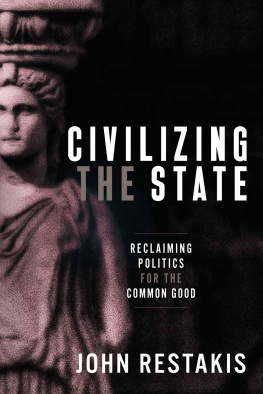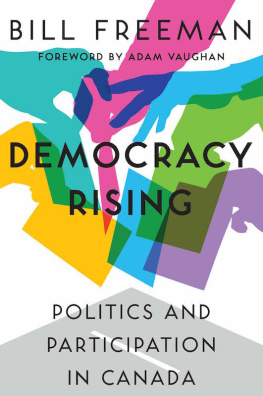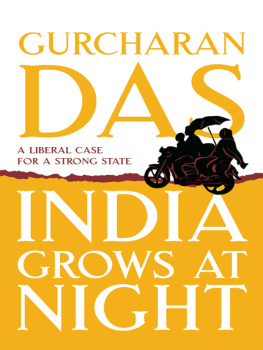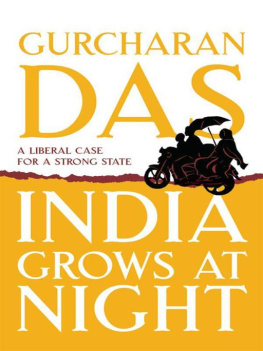Table of Contents
Landmarks
List of Pages
CIVILIZING THE STATE
Praise for Civilizing the State
John Restakis confronts one of the most important and neglected issues of our time. The nation state as we know it is an obsolete institution. With compelling and authoritative examples Civilizing the State lays out the problem and tests the solutions. An essential read for everyone concerned about the human future.
David Korten, author, When Corporations Rule the World and The Great Turning: From Empire to Earth Community
As reactionary forces surge to the fore, John Restakis offers a bold vision for reinventing the state as a partner of the social economy, commons, and grassroots democracy. Thoughtful, provocative, and hopeful.
David Bollier, commons activist and scholar, co-author, Free, Fair, and Alive
Could a better society be taking shape amidst the shards of our currently suicidal civilization? John Restakis makes a persuasive case that it is. He takes readers back to antiquity and up through intriguing experiments in our own time to explain that to solve the global crisis of the liberal state we must broaden, deepen, and enrich self-government. In Civilizing the State, readers will find both illumination and hope.
Nancy MacLean, William H. Chafe Distinguished Professor of History and Public Policy, Duke University, author, Democracy in Chains: The Deep History of the Radical Rights Stealth Plan for America
These are times of fragmentation and despair, where we sorely need concrete utopias that can inspire us to construct the successor civilization. This record of our times provides grounds for optimism as we navigate the meta-crisis of civilization by linking grounded dreams to practical action. From the radical municipalism of Barcelona to the stateless democracy of Rojava, John Restakis gives us a portrait of partner state solutions that make possible the individual and social autonomy that we need in these critical times.
Michel Bauwens, director and founder, P2P Foundation, co-author, Peer to Peer: The Commons Manifesto
John Restakis Civilizing the State is a timely and necessary book in these times of corporate hijack of the state through neoliberal globalization. Three decades of deregulation have transformed welfare states for the people, of the people, by the people into corporate states for the corporations, of the corporations, by the corporations. Nation states run by corporations for privatization of the commons and public goods are now mutating into corporate, surveillance states. Through examples of practice of direct democracy and political philosophies of civic participation, Restakis shows how we can reclaim democracy and the commons and shape a future for the common good.
Vandana Shiva, ecological scientist, activist, founder, Research Foundation for Science Technology and Ecology and Navdanya, founding board member, International Forum on Globalisation, author, Earth Democracy and Oneness Vs. the 1%
This book will transform how you think about politics and power. The partner state breaks through the tiring squabbles about less or more government instead, the question becomes how government can enable thicker, richer democracy in everyday life. Through stories that are both practical and radical, John Restakis introduces us to the politics we need for the 21st century.
Nathan Schneider, professor and journalist, author, Everything for Everyone: The Radical Tradition that Is Shaping the Next Economy and Thank You, Anarchy: Notes from the Occupy Apocalypse
John Restakis Civilizing the State deserves careful consideration. It is informative, perceptive, and persuasive. The book explores the notion of the common good and critically examines the role of democratic politics in enhancing cooperative behavior. A thorough expert in cooperative economics, Restakis gives the reasons why we need to civilize the state if we want to avert the risks of authoritarian governments, crony capitalism, and populisms of various sorts that threaten democracy. The type of politics which this book proposes is founded on the refusal of singularism and on the affirmation that rights cannot be separated from duties. This book is a must read for anyone who desires to think seriously about the future of our societies, freeing ourselves from some of our principal contemporary illusions.
Stefano Zamagni, economics professor, University of Bologna, author, History of Economic Thought and Civil Economy
CIVILIZING THE STATE
RECLAIMING POLITICS FOR THE COMMON GOOD
JOHN RESTAKIS

Copyright 2022 by John Restakis.
All rights reserved.
Cover design by Diane McIntosh.
Cover image iStock
Printed in Canada. First printing November, 2021.
Inquiries regarding requests to reprint all or part of Civilizing the State should be addressed to New Society Publishers at the address below. To order directly from the publishers, please call toll-free (North America) 1-800-567-6772, or order online at www.newsociety.com
Any other inquiries can be directed by mail to:
New Society Publishers
P.O. Box 189, Gabriola Island, BC V0R 1X0, Canada
(250) 247-9737
LIBRARY AND ARCHIVES CANADA CATALOGUING IN PUBLICATION
Title: Civilizing the state : reclaiming politics for the common good / John Restakis.
Names: Restakis, John, author.
Description: Includes bibliographical references and index.
Identifiers: Canadiana (print) 20210270136 | Canadiana (ebook) 20210270209 | ISBN 9780865719439 (softcover) | ISBN 9781550927368 (PDF) | ISBN 9781771423328 (EPUB)
Subjects: LCSH: Cooperation. | LCSH: Democracy. | LCSH: Common good. | LCSH: State, The. | LCSH: Civil society.
Classification: lcc hd2963 .r45 2021 | ddc 334dc23
New Society Publishers mission is to publish books that contribute in fundamental ways to building an ecologically sustainable and just society, and to do so with the least possible impact on the environment, in a manner that models this vision.

Contents
Acknowledgments
Over the course of writing this book, I have been assisted by friends and colleagues whose reading and critical feedback of the early drafts have helped immeasurably in improving the text. Special thanks are due to Stefano Zamagni, Trebor Scholz, Vasilis Kostakis, David Korten, Nathan Schneider, Michel Bauwens, Ana Maria Peredo, Guy Dauncey, Kevin Flanagan, Leman Heseno, Ed Mayo, and Henry Tam. I am also deeply indebted to my colleagues and co-conspirators, Mike Lewis, Mike Gismondi, and Pat Conaty at Synergia Institute whose friendship and collaboration have so enriched my own analysis and understanding of the patterns that underlie the converging crises with which human society is confronted. It is a reminder that the solidarity and friendship of fellow travelers is as crucial to remaking the world as the values which drive us to the effort.
INTRODUCTION
THERE ARE MOMENTS that define an epoch. Such a moment came on January 6, 2021, when white supremacists, incited by Donald Trump, broke through police barriers and stormed the U.S. Capitol. The world watched in disbelief as the doors to the House chamber were barricaded and members of Congress fled for safety while Trump supporters, sporting confederate flags and fascist insignia, roamed the halls looking for legislators they had branded as traitors. Some had come with zip-tie cuffs to take hostages and hang those who had opposed Trumps efforts to overturn the presidential election. Outside the Capitol, a gallows had been built, complete with noose. Vice President Mike Pence and House Speaker Nancy Pelosi were high on their hit list.













